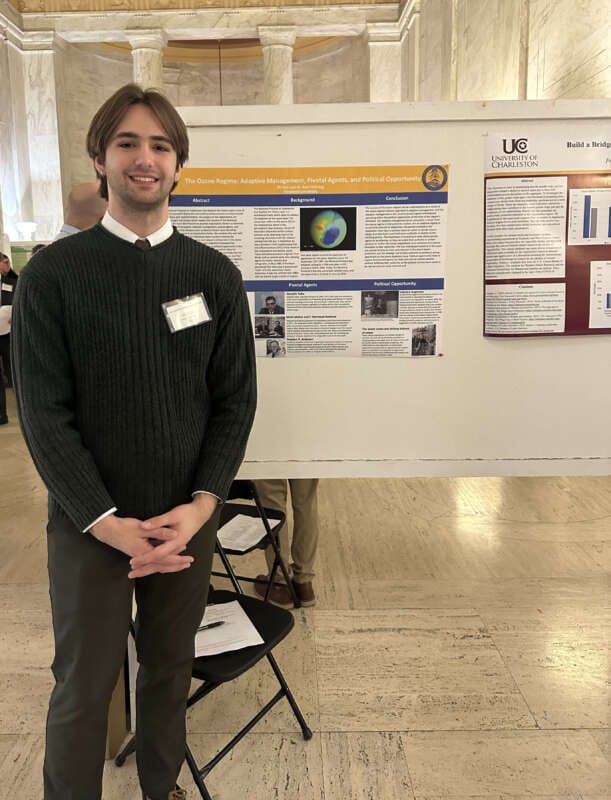ISSUED: 27 February 2024
MEDIA CONTACT: Cecelia Mason
SHEPHERDSTOWN, WV — Shepherd University student Eli Hall, a senior from Hansford, West Virginia, is the fourth student from the university to be named a finalist for the prestigious Truman Scholarship. Hall said being a finalist is a great honor.
“I am flattered to be recognized for my efforts since being at Shepherd University, and I am now among of a few of my peers who have been designated as finalists in previous cycles who I deeply respect,” Hall said. “If I am designated as Shepherd University’s first Truman Scholar, that is an experience that I will carry with me for the rest of my life.”
“Eli’s selection as a finalist reflects both his commitment to service and his passion for solving environmental challenges,” said Dr. Sam Greene, co-chair, Department of Social and Applied Behavioral Sciences. “His status as a finalist is well-deserved, and I look forward to working with him to prepare for his interview in April.”
Hall is one of two students from West Virginia who are finalists for the scholarship, which covers expenses to attend graduate school. He is among 191 students from 136 institutions who will interview with the Foundation’s Regional Review Panels between March 1 and April 3. Greene will help Hall prepare for his April 3 interview, which will take place in Washington, D.C.
Preparation for the Truman Scholarship falls under the Paul and Lisa Welch Distinguished Awards Program at Shepherd. The program was established to provide targeted assistance to students and faculty preparing for competitive prestigious scholarships, fellowships, and award programs such as the Truman Scholarship. Hall is the fourth Shepherd student since 2020 to be named a Truman finalist.Hall has achieved many other accomplishments during his time at Shepherd. He attended the 2023 Harvard Kennedy School’s Public Policy Leadership Conference from October 12-15 and has been accepted into Princeton University’s Junior Summer Institute from June 6-July 28.

Hall presented his research at the West Virginia Capitol on February 22.
Hall has also presented research he’s doing with Dr. Aart Holtslag, associate professor of political science, twice—on November 3 and 4, 2023, at the International Studies Association Northeast Conference in Providence, Rhode Island, and February 22 at the West Virginia State Capitol for Undergraduate Research Day.
The paper, titled “The Ozone Regime: Adaptive Management, Pivotal Agents, and Political Opportunity,” looks at why the 1987 Montreal Protocol international agreement was so successful. The Montreal Protocol is a landmark multilateral environmental agreement that regulates the production and consumption of nearly 100 man-made chemicals that are known ozone depleting substances. Hall and Holtslag are exploring why this environmental agreement on atmospheric issues was universally ratified while climate change agreements proposed in more recent years are not.
“There were three consistent themes that popped out to me,” Hall said. “The success of the protocol was often attributed to its ability to adapt to new circumstances. During the formation of the protocol, you can find certain key individuals who were very important in pushing it forward. Lastly, there was political opportunity, with the protocol being formed toward the end of the Cold War around the time the Berlin Wall collapsed, so I think for this reason and others there was a lot of political ripeness for such a protocol to come into existence.”
Hall, who plans to graduate in May 2025, is earning two degrees with three majors—a Bachelor of Science in political science and environmental studies and a Bachelor of Arts in global studies.
“What I’m interested in academically is the intersection of those three things,” he said. “Climate change comes to mind and making effective agreement to deal with climate change. It seemed possible, and that was just interesting to me.”
Hall hopes to attend graduate school and focus on international relations or public policy.
“Given what I’m interested in is the intersection of politics and the environment on the global scale, I think international relations would make a lot of sense,” he said. “But if I do public policy work related to the environment here in West Virginia, I think I would find a lot of fulfillment in that too.”
Hall chose to attend Shepherd because it was far from home and is located close to Maryland, Virginia, and Washington, D.C. He believes it was a great choice because of all the opportunities he’s been able to take advantage of, especially getting to work with Holtslag on research.
“I think the fact that I was able to do it is a testament to what I think is Shepherd’s biggest strength, which is the student-to-faculty ratio,” Hall said. “I know other students who have similar stories about their relationship with their professors. The ability to have a professor look at you and say ‘I can tell you what opportunities might be available to you, or might work best for you, or that you might just be interested in.’ I think this sort of thing has helped with my future and can help with other students’ futures.”
About the Truman Scholarship:
Established by Congress in 1975 as the living memorial to former President Harry S. Truman and a national monument to public service, the Truman Scholarship carries the legacy of the 33rd President by supporting and inspiring the next generation of public service leaders. Truman Scholars demonstrate outstanding leadership potential, a commitment to a career in government or the nonprofit sector, and academic excellence. Each Truman Scholar receives funding for graduate studies, leadership training, career counseling, and special internship and fellowship opportunities within the federal government.
— 30 —


